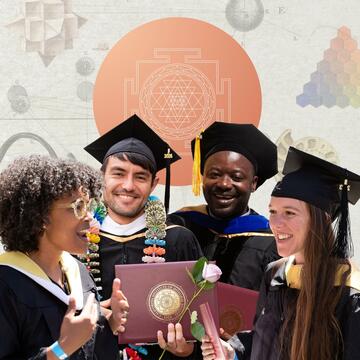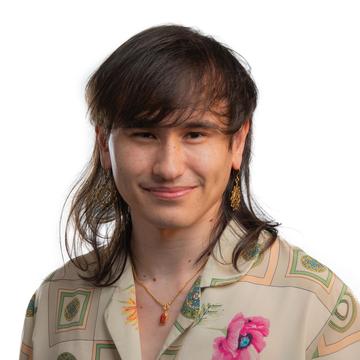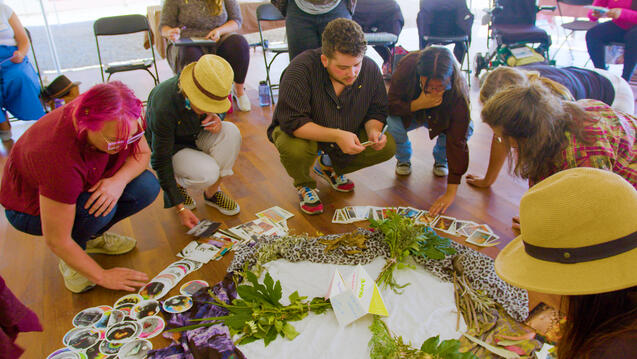A Faculty-Led Info Session with Christine Brooks

M.A. in Expressive Arts Coaching & Community Building
Co-create brighter futures through the power of expressive arts and the strength of community.
Program Overview
Join Us
The Master of Arts in Expressive Arts Coaching & Community Building is more than a degree — it is a transformative experience. Whether you aspire to coach individuals, lead community initiatives, or consult in organizational settings, this program equips you with the skills, knowledge, and confidence to make a meaningful impact.
Start your journey today. Classes begin January 2026.
Our Approach
The M.A. in Expressive Arts Coaching & Community Building is designed for those who seek to use the power of expressive arts to foster resilience, connection, and positive change in individuals, groups, and diverse communities. It is a four-semester, fully online, 32-unit program that combines academic rigor with experiential learning, and includes:
- Virtual intensives: Two four-day synchronous cohort gatherings build community and deepen learning, held in the first (spring) and third (fall) semesters of the program.
- Flexible online learning: Asynchronous courses accommodate working professionals and students in diverse geographic locations.
This program draws on CIIS’ commitment to integral education, emphasizing relational-cultural theory, narrative and collaborative practices, and liberation psychology. The curriculum encourages students to apply these principles to innovative coaching and community-building praxis.
With the guidance of academic advisors and coaching supervision over their study in the program, students graduate with a unique foundation for their practice and professionalism as credentialed coaches, expressive arts facilitators, and leaders in the field.
Career Paths
Graduates of this program are prepared to work in a variety of settings, which include:
- Individual and group coaching
- Organizational consulting
- Community arts programs
- Educational institutions
- Social change initiatives
Students graduate with practice hours they can apply toward credentialing through the International Coaching Federation’s (ICF) Portfolio Path, and as a Center for Credentialing & Education (CCE) Board Certified Coach (BCC).
Curriculum
Our innovative curriculum includes:
- Expressive arts-based coaching skills and praxis
- Relational-cultural arts-based coaching for transformation
- Community building and group coaching through narrative expressive arts
- A capstone integrative seminar
Students engage in both academic coursework and practical coaching experiences, culminating in a capstone project that integrates their learning with real-world application.
Curriculum Highlights
Relational-Cultural Arts-Based Coaching and Community Building for Transformation
Painting, drawing, performing, storytelling, writing, dancing, singing, craft-making are intrinsic to the human experience. These multiple epistemologies are the currency through which we make meaning and pass along knowledge across and between generations. Contemporary dominant social science traditions have often privileged individuality and independence over collaboration and interdependence, empiricism and logic over the metaphysical and the intuitive; the mind/body split. In this class we reclaim and place at the center embodied, aesthetic, sensuous and relational ways of knowing in service of advancing transformative practices in coaching and community building.
Navigating Systems: Applied Improvisation and Approaches in Power Dynamics
Students will draw upon Relational Cultural Neuroscience and liberatory power dynamics to support their coaching practices and clients. This course implements theories on accessing liberatory power and collective energy, in addition to drama therapy and psychodrama methods including improvisation, sociometry, playback theater and Theatre of the Oppressed, to explore possible power differentials within real-time/real-life social systems. Exploring embodied and designed organizational genograms assists students in examining how prevailing relational-cultural organizational power dynamics shape the coach role in work with individuals and groups, and in community building. Students learn how these factors contribute to a facilitator’s ability to effectively support themself and, where appropriate, advocate for their clients.
Integrative Seminar
This course integrates various concepts from the program into a unified whole: integrative expressive arts skills; cumulative group experience; arts-based research and inquiry; and the coaching experience of the practicum. With this integration, students will deepen their understanding of coaching communication across differences including those of race, social class, gender, ethnicity, and physical abilities. This seminar is an intensive learning process designed to demonstrate critical knowledge in the student’s coaching and community building approaches. It also demonstrates the ability to reflect critically upon all work accomplished during the course of the program, while clarifying professional goals. The course includes an oral and written capstone presentation which demonstrates a cogent exploration of the student’s philosophical underpinnings, knowledge of theoretical frameworks, and current research in the field, and a detailed review of an example of the student’s current coaching work.
-
Year 1
Semester 1 | Spring
Virtual Retreat (1 unit)
Expressive Arts Approach I (during retreat) (1 unit)Expressive Arts-Based Coaching and Community Building Skills and Praxis (3 units)
Relational-Cultural Arts-Based Coaching for Transformation (3 units)
Semester 2 | SummerAdvanced Coaching Skills for Empowerment and Change (3 units)
Appreciating Research in Expressive Arts Coaching & Community Building (3 units)
Coaching Practicum Skills Lab (2 units)
Year 2Semester 3 | Fall
Virtual Retreat (1 unit)
Expressive Arts Approach II (during retreat) (1 unit)
Expressive Arts Varieties in Group Dynamics and Coaching Praxis (3 units)
Practicum (3 units)
Semester 4 | SpringIntegrative Seminar (Capstone) (3 units)
Practicum (3 units)
Applied Improvisation with Systems and Approaches on Power Dynamics (1 unit)
Expressive Arts Coaching & Community Building Professional Development (1 unit)
Support for Online LearningCIIS provides robust support for online learners, including:
- Virtual library resources
- Technology support for our Canvas learning management system
- Online academic advising and coaching supervision
Entry Requirements
We welcome applications from individuals with a minimum of a bachelor’s degree who are passionate about using expressive arts for coaching and community growth and change. The program is ideal for:
- Professionals in the arts, health care and human services, education, organizational consulting, spiritual community, and social-justice fields
- Artists and educators seeking to expand their impact and careers
- Individuals interested in earning professional coaching certifications and an expressive arts educator credential
If you would like to learn more about this program, we’re here to help. Explore our program further with in-depth materials, attend one of our open houses or info sessions, or discuss your personal and career goals with our admissions counselors, who are ready to assist you in navigating the application process.
Required Application Materials
Online Admissions Application: Begin the application process by submitting an online application and paying the non-refundable $68 application fee.
Degree Requirement: A minimum of an undergraduate degree (B.A., B.S., or BFA), or an M.A., M.S., MFA, or Ph.D. from an accredited college or university.
Minimum GPA: A GPA of 3.0 or higher in previous coursework is required. A GPA below 3.0 does not automatically disqualify an applicant. CIIS will consider a prospective student whose GPA is between 2.0 and 3.0. These individuals are required to submit a GPA Statement and are encouraged to contact the Office of Admissions to discuss their options.
Transcripts: Official transcripts from all accredited academic institutions attended where 7 or more credits have been earned. If transcripts are being mailed to CIIS, they must arrive in their official, sealed envelopes. Transcripts from institutions outside the US or Canada require a foreign credit evaluation through World Education Services (WES); CIIS will also accept foreign credential evaluations that are in a comprehensive course-by-course format from the current members of the National Association of Credential Evaluation Services (NACES).
Short Essay Responses: Please write a series of brief responses, one for each of the following prompts in the order that they appear:
- Why are you interested in applying to CIIS specifically to study Expressive Arts Coaching and Community Building? (350 words maximum)
- Describe the creative arts modalities you would bring with you into the Expressive Arts Coaching and Community Building program. (350 words maximum)
- Please describe the arts, human services and/or personal growth, or educational experiences you have had that inform your desire to practice as a coach and community builder. (200 words maximum)
- What internal and external strengths and resources do you draw from to help you cope in your daily life? What social supports does this include? (200 words maximum)
- Our graduates are expected to be able to work with people from very diverse social, cultural, sexual/affectional preference, gender, and socioeconomic backgrounds. What is your experience of relating across dimensions of difference? (200 words maximum)
- The online program requires a high level of self-directed, autonomous work in addition to the ability to work online in groups. Please describe your experience in: a) working individually, and b) working collaboratively in a group to meet a deadline. (200 words maximum)
- Due to the online nature of our education delivery format, students must demonstrate the ability to work with/navigate online learning formats. Please describe a challenge you have encountered in working in an online learning environment and how you overcame (or imagine overcoming) the challenge. (200 words maximum)
Two Letters of Recommendation: Letters of recommendation will be accepted from academic advisors, professors, professional supervisors, or someone able to attest to your ability to undertake the work required for this program. Recommenders should use standard business format and include full contact information: name, email, phone number, and mailing address.
Academic Writing Sample: Five consecutive pages of your academic writing (typed, double-spaced) that demonstrate your capacity to think critically and reflectively. The sample should show academic-level writing abilities. You may submit copies of previous work, such as a recent academic paper, an article, or a report. Outside sources require proper citations and references in addition to the required written five pages.
A Current Resume detailing your educational and professional experience.
International Student Information
Events and Info Sessions
An Online Event with Admissions Counselors


FAQ
-
Have you experienced the power of the arts while navigating life’s challenges or building connections? Have activities like creative writing, painting, dancing, or improvisational acting helped you feel more grounded, inspired, or connected to others? Are you seeking a career that integrates your passion for the arts with a desire to foster growth, resilience, and systemic change for communities of people?
We offer a pathbreaking combination of academic rigor, expert faculty, and the embrace of the personal and relational power of the arts to shape your unique identity as an Expressive Arts Coach & Community Builder. Through our program, you’ll learn to engage the arts as potent tools for coaching, consulting, and facilitating change for diverse individuals, communities, and organizations.
-
Books
- The Connection Cure, Julia Hotz (2024)
- Holding Change: The Way of Emergent Strategy Facilitation and Mediation, adrienne maree brown (2021)
- Coaching Beyond Words, Anna Sneathen (2019)
- Building your Ideal Private Practice (2nd edition): A Guide for Therapists and other Healing Professionals, Lynn Grodzki (2015)
- Coaching for Transformation: Pathways to Ignite Personal & Social Change, Martha Lasley et al. (2015)
- Using Expressive Arts to Work with Mind, Body and Emotions, Helen Wilson and Mark Pearson (2009)
Websites
-
Before entering the world of expressive arts coaching as a graduate student, we recommend that you get involved in your community. Practical experience in human services, volunteer work, social change initiatives and local arts are important early steps of the learning experience: Volunteer at an LGBTQIA+, youth services, or senior center, or another human services organization, or in a school or arts setting. Participate in social change programs and organizations. Take workshops that are focused on creative art therapies or process art-making via arts organizations. Additionally, prepare by attending cultural and arts events and exploring spiritual practices related to a background other than your own. Consider studying art forms that are unfamiliar to you. For instance, if you are a singer, explore fine arts. If you are a ceramicist, try taking singing classes. A poet might study improvisation. The sky's the limit!
-
Our program offers a broader, richer, and more creative approach to coaching than shorter-duration certificate programs. Rather than training in just one method, students will gain a comprehensive education in diverse approaches to coaching including understanding the psychology of facilitation. Our program shapes well-rounded professionals, who combine best practices in the field with their expertise in narrative expressive arts. Your practitioner skills will be grounded in collaborative learning and peer support, and nurtured by a diverse cohort. Our competency-based model is geared towards national and international certification from a range of widely recognized professional organizations, and culminates in a graduate degree that opens up a world of possibilities.
-
Students gain a unique specialization in expressive arts coaching after completing core course work and coaching hours requirements that can lead to coaching certification through the International Coaching Federation (ICF) and/or certification as a Board Certified Coach (BCC) through the Center for Credentialing & Education (CCE). Post-graduation coaching hours and supervision may be required from the accrediting body, depending upon individual student performance during the program. Please review the requirements of each credential for additional details.
-
Yes! Coaching is a global profession that is increasing in accessibility and visibility in all sectors. Our coaches are eligible to offer their services anywhere in-person, or via telehealth platforms, telephone, and written technologies.

Take the Next Step
For over 50 years, CIIS has been at the forefront of education that integrates rigorous science, innovative scholarship, and social justice. You will learn from faculty at the forefront of their fields, local artists and activists, and a community of peers as passionate and dedicated as you. There’s never been a better time to be here — let’s build a healthier and more equitable world.



